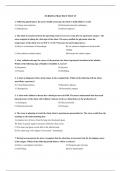Exam (elaborations)
NURSING PRACTICE TEST IV 100 QUESTIONS AND ANSWERS VERIFIED EXAM
- Course
- NURSING PRACTICE IV
- Institution
- Baptist School Of Nursing
1. Following spinal injury, the nurse should encourage the client to drink fluids to avoid: A) Urinary tract infection. B) Fluid and electrolyte imbalance. C) Dehydration. D) Skin breakdown. 2. The client is transferred from the operating room to recovery room after an open-heart surgery. The n...
[Show more]



